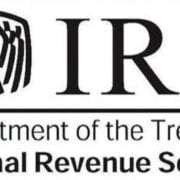It’s Tax Time! Electronic Filing Could Speed Returns
–information courtesy of the Internal Revenue Service
The 2022 tax filing season is off and running and the IRS is asking taxpayers to take extra precautions to file an accurate tax return electronically, which could help speed refunds. This year’s deadline to file is April 18, according to information from the IRS.
Employers are busy preparing those 2021 tax statements for employees, which usually arrive by the end of January.
More than 160 million individual tax returns for the 2021 tax year are expected to be filed, with most before the April 18 tax deadline.
Most taxpayers face an April 18 deadline this year due to the Emancipation Day holiday in Washington, D.C falling on April 15. The deadline to file taxes in North Carolina is April 18.
IRS Commissioner Chuck Rettig noted that taxpayers need to take special care this year due to several critical tax law changes that took place in 2021 and ongoing challenges related to the pandemic.
“IRS employees are working hard to deliver a successful 2022 tax season while facing enormous challenges related to the pandemic,” Rettig said. “There are important steps people can take to ensure they avoid processing delays and get their tax refund as quickly as possible. We urge people to carefully review their taxes for accuracy before filing. And they should file electronically with direct deposit if at all possible; filing a paper tax return this year means an extended refund delay.”
For most taxpayers who file a tax return with no issues, the IRS anticipates they will receive their refund within 21 days of when they file electronically if they choose direct deposit – similar to previous years. Last year’s average tax refund was more than $2,800.
“There are simple steps that people can take that will help them navigate this challenging tax season,” Rettig said. “Filing electronically and using online resources instead of calling are just some of the steps that can help people avoid delays.”
“IRS employees will do everything possible with the available resources to serve taxpayers this year,” Rettig said. “We will work hard to deliver refunds quickly, serve as many people as possible and work to catch up on past tax returns affected by the pandemic.”
Consult a local tax professional or your personal tax consultant for guidance on completing tax returns. Following is a list of tips from the IRS:
Fastest refunds by e-filing, avoiding paper returns: Filing electronically with direct deposit and avoiding a paper tax return is more important than ever this year to avoid refund delays. If you need a tax refund quickly, do not file on paper – use software, a trusted tax professional or Free File on IRS.gov.
Avoid delays; file an accurate tax return: More than ever this year, the IRS urges people to make sure they’re ready to file an accurate tax return. An accurate tax return can avoid processing delays, extensive refund delays and later IRS notices.
Special care for EIP, advance Child Tax Credit recipients: The IRS also encourages caution to those people who received a third Economic Impact Payment or advance Child Tax Credit in 2021. Taxpayers should ensure the amounts they’ve received are entered correctly on the tax return. Incorrect entries when reporting these payments mean the IRS will need to further review the tax return, creating an extensive delay. To help taxpayers, the IRS is mailing special letters about the stimulus payments and advance Child Tax Credit payment amounts. People can also check the amount of their payments in their Online Account available on IRS.gov.
Earned Income Tax Credit or Additional Child Tax Credit refunds: By law, the IRS cannot issue a refund involving the Earned Income Tax Credit or Additional Child Tax Credit before mid-February, though eligible people may file their returns beginning on January 24. The law provides this additional time to help the IRS stop fraudulent refunds from being issued.
Avoid phone delays; online resources best option for help: IRS.gov is the quickest and easiest option for help. IRS assisted phone lines continue to receive record numbers of calls, more than the agency can handle with its limited resources. Avoid delays: Check IRS.gov first for refund information and answers to tax questions. Establishing an Online Account on IRS.gov can also help taxpayers get information quickly. The Online Account feature has recently been expanded to allow more people to gain access.
Don’t normally file a return? Consider filing for CTC, other valuable credits: For people who don’t normally file a tax return and didn’t file a 2020 return or use the Non-Filers tool, they can still qualify for important credits they’re eligible for, including the Recovery Rebate Credit (stimulus payment), advance Child Tax Credit or the Earned Income Tax Credit. The IRS encourages people in this group to file a 2021 tax return so they can receive all the credits for which they’re eligible.
Online options for free help; answers to common questions: Use IRS.gov to get answers to tax questions, check a refund status or pay taxes. There’s no wait time or appointment needed — online tools and resources are available 24 hours a day.
Other free options for help: IRS Free File is available to any person or family who earned $73,000 or less in 2021. Qualified taxpayers can also find free one-on-one tax preparation help around the nation through the Volunteer Income Tax Assistance (VITA) and Tax Counseling for the Elderly (TCE) programs.
2020 tax return still being processed? Tips to help with filing 2021 tax return: For people whose tax returns from 2020 have not yet been processed, they can still file their 2021 tax returns. For those filing electronically in this group, here’s a critical point. Taxpayers need their Adjusted Gross Income, or AGI, from their most recent tax return when they file electronically. For those waiting on their 2020 tax return to be processed, make sure to enter $0 (zero dollars) for last year’s AGI on the 2021 tax return. Visit IRS.gov for more details.
April 18 tax deadline: The filing deadline is April 18 for most taxpayers; automatic six-month extensions of time to file are available for anyone by filing Form 4868, Application for Automatic Extension of Time to File U.S. Individual Income Tax Return.


